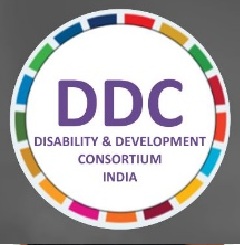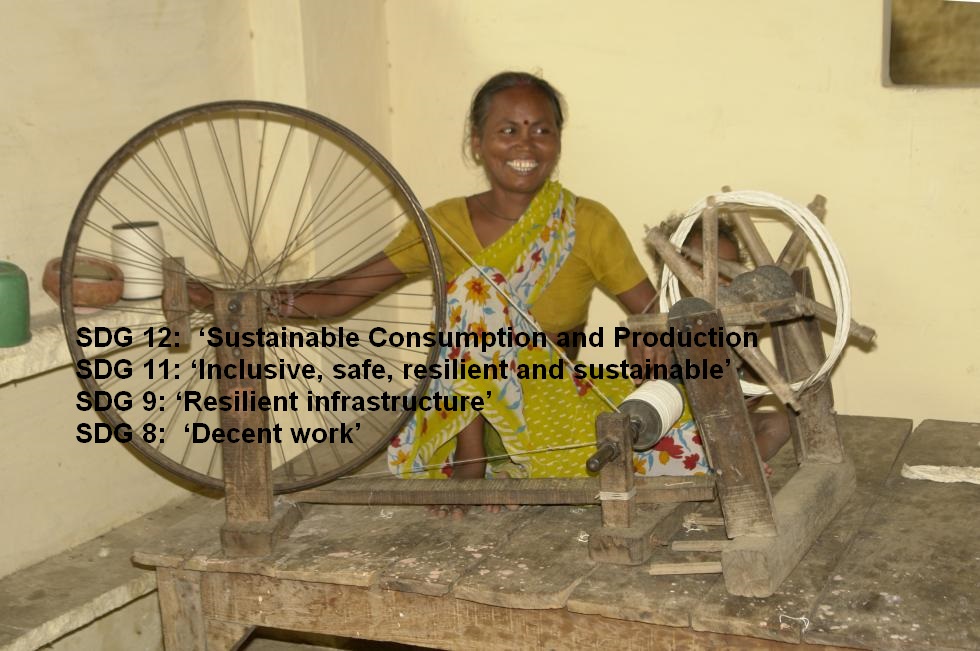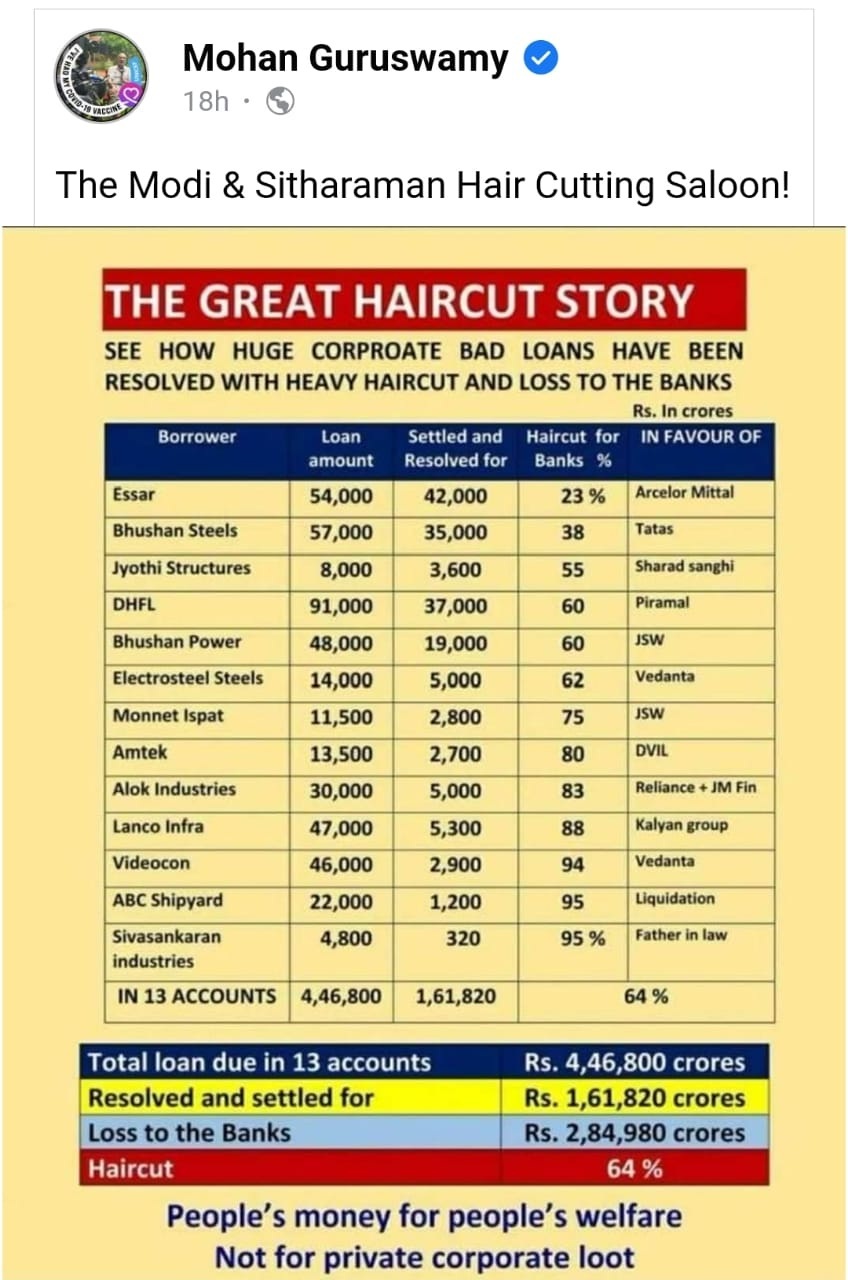'Silent Majority' Supported the Three Farm Laws: SC-Appointed Committee Report https://thewire.in/agriculture/farm-laws-supreme-court-committee-report-released Anil Ghanwant, one of the three members of the committee, made the report public on Monday.
Statiscally, an overwhelming 85.7% of the farmer organisations the committee directly interacted with lent support to the three controversial farm laws.
Out of the 266 farmer organisations to whom invitations were sent, the committee could directly interact with only 73 organisations. The report claims that out of these 73 organisations, 61 organisations (85.7%) representing over 3.3 crore farmers fully supported the laws. Four farmers’ organisations, representing 51 lakh farmers (13.3%), did not support the Act. Another seven farmer organisations, representing 3.6 lakh farmers (1%) supported the Acts with some suggestions for modifications. Further, Ghanwat said the 40 unions, which had organised agitations against the laws under the banner of the Samyukt Kisan Morcha (SKM), did not make any submission despite repeated requests.
Ghanwat said the 40 unions, which had organised agitations against the laws under the banner of the Samyukt Kisan Morcha (SKM), did not make any submission despite repeated requests. However, their concerns, as ascertained from media reports and interactions with Government, have been kept in mind by the Committee, while formulating its recommendations,” the report reads, according to the Indian Express.
Comment: But their concerns where not included in the headline, of the same story.. So going by Ghamwat's stat of 266 farmers who were contacted on 61 organisation came back with a support for the three laws.. means that more than two thirds of farmers organisations boycotted the questionnaire. The report then has an online opinion poll, which asks leading questions.. and of course they say that two third support the black laws. They ignore that fact that while the black laws may enable some thing, it disables and makes difficult hitherto beneficial provisions. It pretends that the only way to be more free and give more options to the farmers is to allow all kinds of elements, like corporates to have a role.. It ignores the responsibility of the State to facilitate good cooperative systems.....
'73 में से 61 किसान संगठन कानून के साथ', SC की बनाई Committee ने किया बड़ा दावा | 5 Ki Baat Mar 22, 2022
एक साल तक देश की राजधानी की सीमाओं पर कृषि कानूनों के खिलाफ किसान आंदोलन चला. फिर ठीक चुनावों से पहले कानून रद्द कर दिए गए. एक साल तक इन कानूनों की समीक्षा के लिए सुप्रीम कोर्ट की बनाई कमेटी कि रिपोर्ट अदालत के पास रही. उसे ना तो सार्वजनिक किया गया, ना उस पर कोई कार्रवाई हुई.
'जब आंदोलनकारी संगठनों से बात नहीं की गई, तो ये संगठन कौन थे?': किसान नेता Yogendra Yadav
Mar 22, 2022
सुप्रीम कोर्ट (Supreme Court) की कमेटी और उसके रिपोर्ट पर सवाल खड़े करते हुए किसान नेता योगेंद्र यादव (Yogendra Yadav) ने NDTV से कहा कि, 'सबसे बड़ा सवाल ये है कि आंदोलनकारी संगठनों से बात नहीं की गई. ऐसे में ये 73 संगठन कौन थे, जिनसे बात की गई? कम से कम इस बात से पर्दा तो उठा.'
Comments: AA.. Avik Saha's talk on the report of the committee, I listened to. (In English). He said the committee has gone beyond it's mandate from the Supreme court and made 2 recommendations. 1) Cut down procurement for MSP and 2) Dismantle the PDS and give DBT to ration card holders. If true, these two measures will seriously damage food security.
Why the Supreme Court now thinks it was wrong to claim that reservations undermine the idea of merit Umang Poddar Jan 27, 2022 https://scroll.in/article/1015729/why-the-supreme-court-now-thinks-it-was-wrong-to-claim-that-reservations-undermine-the-idea-of-merit
The Supreme Court recently upheld 27% OBC reservations in the All India Quota seats of NEET UG and PG Exams. the court said that although many want to draw a binary between merit and reservation to say that “reservation is antithetical to establishing meritocracy”, merit “cannot be separated” from existing inequalities in society. The court said that even the drafters of the Constitution recognised this and wanted the idea of social justice to be taken into account while promising equality of opportunity. Finally, it said that backwardness does not disappear merely because a candidate has graduated. While graduation may provide certain “social and economic mobility”, that does not create “parity between forward classes and backward classes”.
Full text of judgement available at: https://drive.google.com/file/d/13PU9PuLGdk3mqrsBNeSoCvgZ5UDlno77/view ( courtesy the print.in )
Interrogating the false merit-reservation binary https://www.thehindu.com/opinion/lead/interrogating-the-false-merit-reservation-binary/article38379295.ece Yogendra Yadav Prannv Dhawan February 05, 2022 00:02 IST
February 05, 2022
The Supreme Court’s recent order advances an interpretation that is consistent with the ideals of equality, social justice
The Supreme Court of India’s recent ruling on an all India quota deserves closer attention for a reason other than its impact on post graduate medical admissions.
A Criminal Comedy of Suicidal Errors
WESTERN STRATEGIC THINKERS WHO HAD WARNED OF UKRAINIAN CONFLICT (a compilation by @RnaudBertrand) https://twitter.com/RnaudBertrand/status/1498491107902062592
Poverty, Hunger and Disability: The Missing Link 
Webinar organised by Disability & Development Consortium 9th Feb 2022
Video Report: Each Talk presented seperately
Disability & Development Consortium sets the tone https://youtu.be/_tX4epzOJG4
Moderator: Akhil Paul, Sense International India; Welcome: Ms. Kiran Patidar; Keynote 1: B. Venkatesh; Keynote 2: Arman Ali
Investigating Infrastructure: Ecology, Sustainability and Society - Webinar https://www.youtube.com/watch?v=fmA1rIFKBGU Heinrich-Böll-Stiftung India Jan 27, 2022 Rajni Bakshi , (Journalist/Writer), Kanchi Kohli, (Senior Researcher @Centre for Policy Research), Dolly Kikon, (Anthropologist @University of Melbourne)
Dossier - Investigating Infrastructure: Ecology, Sustainability and Society, bringing together different approaches and perspectives to infrastructure development in India. https://in.boell.org/en/investigating-infrastructure-ecology-sustainability-and-society
Project potential and sustainability is in question. In the public debate are the extreme and unviable forms of infrastructure financing with a dependence on controversial models such as public-private partnerships. Then, there is a critique of the enormous scale and the extreme ‘kind’ of capitalist production and consumption promoted by ‘big-infra’ as ‘race to the bottom’. The elitist top-down politics in the planning and governance of massive projects has been known to sideline democratic local processes. There is fear of regulatory dismantling and harmonization of policies and of technological ‘lock-ins’. Not in adequate focus, and thus increasingly given short shrift are land, livelihoods, environmental and social impacts. Local concerns over these now plague India’s infrastructure landscape resulting in project disruptions and disputes.
 -
-
For an alternative paradigm of development https://in.boell.org/en/2019/02/25/alternative-paradigm-development By Rajni Bakshi 25 February 2019 In terms of tangible steps forward, perhaps, the most notable one is to make regeneration of local economies the cornerstone of Sarvodaya.
The emerging discourse on ‘Degrowth’ calls for a new framework in which the emphasis shifts from gross domestic product (GDP) to that which generates actual social, material and ecological well-being. It also prioritises the values of sufficiency and subsistence rather than equating development with the fulfilment of endless wants.
Degrowth or re-growth has broadly five dimensions:
Development is equated with actual well-being, not just throughput of materials
Steady-state economics are prioritised, instead of systems in which growth is a survival imperative
The aim is to foster a solidarity economy through sharing and cooperation so that the same resources can serve far more people
Consumption is reconfigured to make more judicious use of resources with social pressure and laws to discourage or prevent business models based on planned obsolescence. Instead products are designed to last and be reused.
Value is redefined so that the value of anything is not just what it is worth to a potential buyer in monetary terms, but rather in terms of the actual well-being it generates immediately as well as in the long term.
CJI N V Ramana calls for ‘Indianisation’ of country’s legal system https://indianexpress.com/article/india/justice-system-colonial-not-suited-for-indian-population-says-cji-7517470/
“When I say Indianisation, I mean the need to adapt to the practical realities of our society and localise our justice delivery systems. For example, parties from a rural place fighting a family dispute are usually made to feel out of place in the court. They do not understand the arguments or pleadings which are mostly in English, a language alien to them. These days, judgments have become lengthy, which further complicates the position of litigants. For the parties to understand the implications of a judgment, they are forced to spend more money” .
The CJI stated that it is the duty of lawyers and judges to create an environment that is comforting for the litigants and other stakeholders. “We must not forget that the focal point of any justice delivery system is ‘the litigant-the justice seeker’,” he said, adding that “in this light, usage of alternate dispute mechanism such as mediation and conciliation would go a long way in reducing the friction between parties and would save resources. This also reduces the pendency and requirement for having lengthy arguments with lengthy judgments”.
Comment: Beyond pious words, the SC can easily lay down guidelines for recording and storing at the Panchyat level including some minimum information on the data and documents, oral testimony at any alternative dispute mechanism including Khaps. This will help litigants to approah the higher courts if needed, at the same time record their receipt of the verdicts.
CJI: Executive’s tendency to ignore court orders a worry Dhananjay Mahapatra / TNN / Dec 27, 2021,
unless there is cooperation and assistance from both the executive and legislature, justice to people cannot be ensured by the judiciary single-handedly.
“A popular majority is not a defence for arbitrary actions taken by a government. Every action is mandatorily required to comply with the Constitution. If the judiciary does not have the power of judicial review, then the functioning of democracy in this country would be unthinkable.”
“Courts do not have the power of the purse or the sword. Court orders are only good when they get executed. The executive needs to assist and cooperate for the rule of law to prevail in the nation. However, there appears to be a growing tendency to disregard, and even disrespect court orders by the executive,” the CJI said.
“There is a need to liberate the institution of public prosecutors. Total independence must be granted to them and to make them answerable only to the courts. Historically, prosecutors in India have been under the control of the government. Hence it is not a surprise that they do not act independently. They do nothing to prevent frivolous and non-deserving cases from reaching the courts,” he said.
Full lecture: https://www.youtube.com/embed/5f15_-vtz4E?start=1565&end=3185 &
https://www.youtube.com/embed/5f15_-vtz4E?start=4058&end=17549
Comment.
Farmers, Economists & Democracy ||| Parakala Prabhakar Dec 22, 2021
There is an insidious project underway with regard to the now repealed Farm Laws. The ruling party, an influential section of our economists, a large and vocal section of the urban middle class, and the mainstream media are stealthily, but effectively, pushing a narrative. In this Episode Dr Parakala interrogates this narrative and shows that the farm laws are merely aimed at accelerating market dynamics in the sector without addressing the core issues that plague the agriculture sector in the country. And shows how this narrative's understanding of agriculture merely as an economic sector, the peasant as only an economic actor and food as nothing but a tradable a commodity is completely flawed.
Protest Over Felling Of Trees In Puducherry Dec 9, 2021
In Puducherry's Auroville, protests are being held against a road project. The protesters want the plan altered.
Agitators: "one is a low lying area, which is at the head of a watershed..so where we need to capture water, we need to have plantation that makes the water percolate..
The foundation says "four trees for every tree uprooted will be planted: It says that " a feeling of entitlement which has slowly creeped up in the community.."
Comment: Sound much like the "andolanjeevi jibe. I thought entitlement, and participation in plantation and community affairs is a part of the ideals of such an alternative community.
See this anonymous note: 6th Dec. 2021
We are writing to you with a great sense of urgency from Auroville to bring your attention to its current crisis. Auroville has been an inspiration for thousands of Ecovillages and ecological projects and practices across India and the world. But over the last few days it has descended into a spiral of violence. Forests, people's homes and community processes have been bulldozed.
Over the weekend there have been nightly raiders on youth housing and police aggression, today this was followed by bullying tactics involving a crowd of local villagers. Residents and government representatives used to operate in a delicate balance of power, enshrined in the Auroville Foundation Act. This balance is gone. The central government has appointed members who wish to fast track urban construction at the cost of people’s participation and ecology.
External communication has been forbidden by a gag order, but there is a website where residents are sharing updates: https://standforaurovilleunity.com/
Please read the press release below to get the context. Besides impacting the forests and water resources, this regressive step undermines the very Charter of Auroville, which gives power to the people to come together in a spirit of consultation and collaboration, and build ‘The City of Dawn’ based on unity and consensus.
7th Dec 2021
The police action a second time didn't happen as feared due to pressure from all sources. But the central govt is doing everything to take over Auroville with its puppets.
Through its puppets and destroy the grassroots democracy the city is based on. All planning and implementation has become top-down now.
On line petition https://www.change.org/sosauroville
Post by Ranjan: Wouldn't sign a misled petition that goes against the vision of Roger Anger and Mothers vision for a world city, misled by a group uninformed youth. It is sad to see that the place we have enjoyed bonhomie and pizzas was built in a zone that was not in the master plan of the city!! Ensuring Roger Angers vision and Mothers dream, has not been an easy path, and it doesn't seem to going fwd either.
Hope it gets sorted soon
https://www.auroville.info/ACUR/masterplan/index.htm
Post by Bharat: Having read both the petition and Ranjan's comments re Auroville's 'master plan', I have endorsed the petition, primarily to support the rights of the resident community at large to take its own decisions, without external coercion and the inexcusable, unilateral, 'midnight action'.
Post from GS: 15th Dec. 2021 .Freedom of expression, self-governance and rights of nature are under threat from authoritarian take-over in Auroville. Auroville has been a site for practical ground testing of non-violent systems for food, energy, education, health, architecture, economics and governance for decades. It has been a hub for various alternative movements in India and has inspired thousands of young Indians to walk the path less travelled, think out of the box and challenge the status quo. But it stands to be taken over by authoritarian forces aligned with a dogmatic approach to town planning. .. We need your solidarity urgently. Auroville does not belong to anyone in particular. It belongs to you too
Auroville Residents Continue Resistance Against Road Development | The Wire Explains https://www.youtube.com/watch?v=tunPpWbvxCM Dec 16, 2021 The experimental town of Auroville, Located in Villupuram district in Tamil Nadu, along the Puducherry border, which is premised on the ideas of freedom, peace and tranquillity is in the midst of a crisis. The international township, Auroville, is a human experiment where people are supposed to shed their race, nationality, religion and caste and attempt to live in harmony.
But that harmony has been seriously disturbed. Currently, its residents are protesting against the crown road project

- CIVIL SOCIETY: ENEMY OF THE STATE? 28 November 2021
- Remember how the Constitution was brought into being
- Takeaways from the UN World Leaders Summit at COP26
- Protesters rally in Glasgow's COP26
- Reframing incentives for climate policy action
- Why equity is key to stopping climate change
- The Facebook Crisis in India
- SC Pegasus Ruling Historic; An Indictment of Modi Government: Dushyant Dave
- 11 months of the Samyukta Kisan Morcha movement: Dr Sunilam
- From Bardoli to Singhu ..
- With his Fabindia boycott call, Tejasvi Surya is hurting the soul of Hinduism
- Farmers Clearing part of the Road on Ghazipur Border
- the International Covenant on Civil and Political Rights (ICCPR)
- Supreme Court Says "Right To Protest Can't Be Anytime, Everywhere"
- Begalurut Mob violence.
- Caste, food and ideological imposition
- Farmers' Bharat Bandh and PM Modi's Silence
- Kamla Bhasin
- FREE/DEM
- Modi’s Monetisation Worse than Demonetisation.
Page 11 of 16
